Chris Baty's Blog, page 39
April 21, 2021
3 Most Common Worldbuilding Mistakes for Writers and How to Fix Them
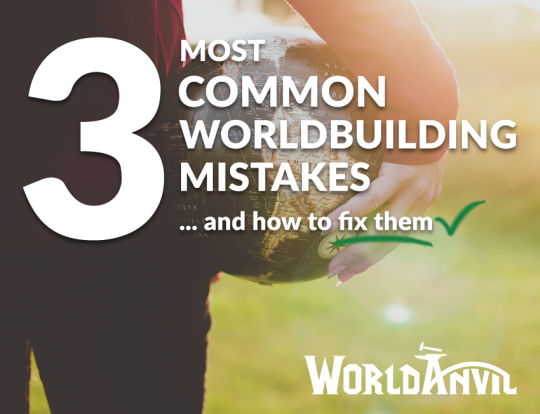
Every year, we’re lucky to have great sponsors for our nonprofit events. World Anvil, a 2021 NaNoWriMo sponsor, helps you develop and organize your characters, plot, and world setting. Today, World Anvil founder Janet Forbes is here to share some pro tips for worldbuilding. Don’t forget to check out the offer to NaNoWriMo writers for 30% off a World Anvil membership!
I talk to hundreds of writers every week, in our World Anvil Q&A live streams, our World Anvil writing challenges, and meetings with our professional authors. And mostly, they’re encountering the same few worldbuilding problems! Here are the 3 most common worldbuilding mistakes, and how you can fix them:
1. Mary-Sue WorldbuildingYou’re probably familiar with the Mary-Sue—a flawless, artificial-feeling main character. Mary Sue Worldbuilding follows in the same vein. If everything in your setting is directly related to your main character, it feels like the world revolves around them. It’s too convenient and artificial. That’s Mary-Sue worldbuilding.
Mary-Sue worldbuilding is usually caused by worldbuilding exclusively around your plot. Introducing larger-scale conflict in the backdrop of your setting, current affairs like civil or religious movements, war, disasters, or technological breakthroughs, can help expand the world beyond just your main character.
Your main character might interact with these elements, or more usually, with problems caused by them. For example, they might help some refugees from “that war over there”. But your character should not be at the core of everything—they’re not the cause of the war. Other things are happening outside of your story, in the background. (Pro-tip: this is a great way to reinforce your genre and themes, and make your world feel alive and expansive, too!).
Fixing Mary-Sue Worldbuilding
Of course you’ll need a series bible like World Anvil to help you keep these current affairs organized, connect them together, and make sure you don’t lose your notes! Use World Anvil’s worldbuilding templates to get inspired for your big conflicts, and remember - you only need to write a few bullet points to start with! You can always expand more later (we’ll talk more about that in a moment).

World Anvil’s Worldbuilding Templates are custom-made by experts to help inspire and guide your creativity—and you can customize your own templates too!
2. Mosaic WorldbuildingYou know those computer game worlds where each area feels like a self-contained zone? Where the “desert” region and the “forest” region have no trade, communication, or overlap between them? That, in a nutshell, is Mosaic worldbuilding. It ruins suspension of disbelief, makes your novel setting feel false, and can pull your readers out of your story!
Fixing Mosaic Worldbuilding
The best way to avoid Mosaic Worldbuilding is to make sure that you have a clear overview of your world early on, with each major region and concept penned out in just a sentence or two. That way, each region will feel like a connected aspect of your seamless setting, not a tile shoved on the side.
On World Anvil, each world setting has a “Worldbuilding Meta” section to help you detail the 10,000 foot overview—the big stuff. And not just your physical world and its people, but your genre, your motivations, and your themes. This invaluable reference tool helps you expand your setting and add more detail, and will also help you sense-check what you’re adding!
Once you have a clear picture of your meta, and know the overview of your world, it’ll be easy to make use of cultural aspects like imports and travellers, cultural diasporas and geographical transition zones to make your world seem more connected and less artificially divided! And you’ll be able to do it without spending too much extra time worldbuilding. Which brings me to my final common worldbuilding mistake…
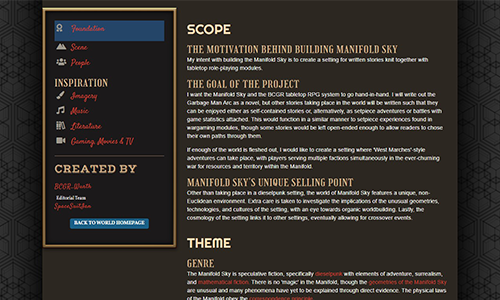
World Anvil’s Worldbuilding Meta tool helps you focus, streamline and sense-check your world setting! It’s full of guides to create an excellent overview for your worldbuilding project. This is the view mode of Manifold Sky by B.C.G. Wurth.
3. Worldbuilder’s DiseaseSounds nasty, right? Well, Worldbuilder’s Disease is a very common problem—a compulsion to continue worldbuilding things which aren’t actually useful. Here’s my favorite example—the “elven shoes”:
In your world you have elves. They wear shoes. So far, so good. Maybe there’s a plot-point where an imposter’s revealed because they’re wearing the wrong shoes. So you fill in a few details on your series bible. But if you find yourself writing a 5,000 word treatise on elven shoes through the ages… honey, you have worldbuilder’s disease.
I use shoes as an example, but it could be anything. It might be detailing three centuries of monarchy, or expanding unvisited areas in excruciating detail. Sure, it can be fun, but all that time spent on unnecessary parts of your setting isn’t helping you polish the core parts—or get your novel written! It’s distracting you from your primary goal.
Curing Worldbuilder’s Disease
There are three major causes of worldbuilders disease:
Lack of perspectiveLovers of proseFear of losing your ideas
1. Lack of perspective
Lack of perspective can often lead down a worldbuilding rabbit hole. Keep clarity on what’s important in your setting with tools like World Anvil’s Worldbuilding Meta. This helps you define your active worldbuilding area - not just geographical but thematic areas—which helps streamline your world and your project, so you can be sure you’re spending your time where it counts!
Also, be clear with yourself WHY you’re worldbuilding the element you’re working on. Keep clear notes in your series bible about how this new element fits into your novel. If it’s little more than set dressing, you only need a few words. For a core concept, you might need more.
2. Lovers of Prose
As writers, we love to write (duh)! But for most of us, writing in prose in our series bible can cause serious problems. Not only does it mean that you write MORE than we should (your get in flow, words happen!), it’s also harder to reference your ideas quickly later on. Stick to short, organized articles in note form. Make sure the salient information is there, and link in anything relevant. You can always expand to prose later if you need to.
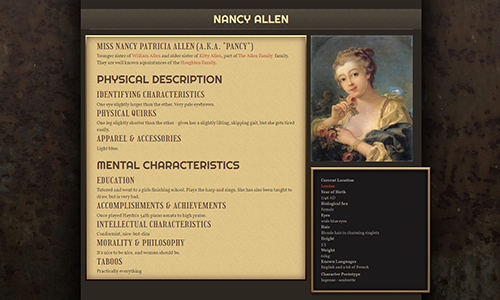
Keep your series bible in brief notes with clear headers! This character article took 5 minutes using World Anvil’s character template which automatically adds the headers. The linked articles help me easily reference related people and places as I’m writing.
3. Fear of losing our ideas
Fear of losing our ideas is actually one of the most common reasons for worldbuilder’s disease—that we’ll forget or lose our notes if we don’t write them out in vast detail. To combat this, make sure you have somewhere to keep your world details safe, organized, tagged and searchable. Then you can reassure yourself that you can go back and develop more later if you need it.
Obviously, World Anvil is custom made for this, backing up everything in one place and linking everything together, so you can easily search, reference and update your series bible whilst writing your manuscript and not have to worry about losing things!
Anything here ring true for you? Or maybe you’re struggling with another worldbuilding mistake or problem? You can always hop into our live streamed Q&A sessions on our Twitch channel and ask us directly! We go live three times a week to answer questions about writing and worldbuilding, as well as helping our community with World Anvil queries too! Maybe we’ll see you there. And happy worldbuilding :)

Janet Forbes is a published fantasy author and RPG writer, whose recent credits include the Dark Crystal RPG with the Henson Company (coming 2021). In 2017, she and her husband created World Anvil, the ultimate worldbuilding and novel writing platform. World Anvil helps you organize, store and develop your worldbuilding and series bible privately, and market your books to the world too! The inbuilt novel writing software, accessible from anywhere, integrates seamlessly with your worldbuilding. And when it’s time to publish, you can export, or publish directly on the World Anvil platform and monetize YOUR way! Check it out at World Anvil.
April 20, 2021
"Read what’s being published in the genre you’re writing. Read old books and new. Get a..."
-
Kristina Forest is the author of YA romance novels, including I Wanna Be Where You Are and Now That I’ve Found You. She earned her MFA in Creative Writing with a concentration in Writing for Children at The New School. She lives in New York City with two huge bookshelves.
Your Camp Care Package is brought to you by Camp NaNoWriMo. Sign up to receive more Camp Care Packages at nanowrimo.org!
April 19, 2021
Read the YWP Novel Excerpt Contest Official Runners-Up!
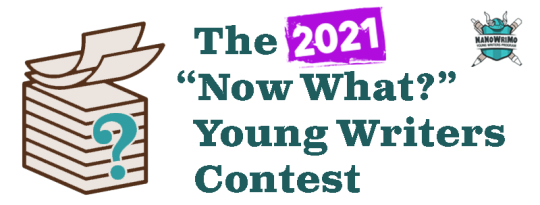
Last month, we challenged our Young Writers to submit a 400 word excerpt from their NaNoWriMo novels. From over 500 fabulous entries, we chose two Grand Prize Winners and four Runners-Up. We hope you enjoy reading them as much as we did!
“Moons Away from Mars” by Lena M. N.They are so close to landing, so close to success, that every tiny beep or flash of light on the dashboard sets Ariel’s heart racing. Each time, she leans forward, pressing her hands against the smooth metal and checks to make sure it’s not an alarm. It never is. The dashboard fills up the room, a base of pale grey metal, with small buttons and screens and various lights set into the metal in neat clusters and rows. When she first saw it, it almost made Ariel back out of the mission… Read the rest!
“The Culture” by ShinmayiExhausted from running from the palace patrol officers, Ilham found himself at the kingdom’s outskirts nearing rogue lands, where his people had been pushed. They still kept a sense of community, regardless of how badly they’d been subjugated. Distressingly, the new global rule would just worsen life for people in every sector… Read the rest!
“Noblebranch” by Caylee D.Catherine hummed.
It used to amuse her: the pond glistening under trees, sitting on the hill, plucking fistfuls of weeds, the coat racks made into human men so she could dance, and yellow flowers peppered on every tabletop. It used to amuse her: that one weekend when she and Henry learned how to swim together and, gasping, stumbled in barefoot and sopping wet, their cheeks ruddy from pride just as much as exertion… Read the rest!
“Something about this death just isn’t adding up,” said Dr. Portas. “How could someone his age die of a heart attack? He was only 33 years old. There was only a 4% chance that he could even have a heart attack.“
“He was also really healthy. Not overweight. No other known conditions,” said Dr. Smith… Read the rest!
April 16, 2021
“My absolute, hands down, one hundred percent favorite thing...
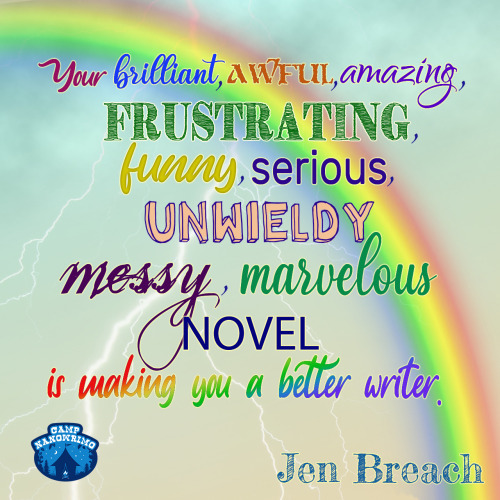
“My absolute, hands down, one hundred percent favorite thing about finishing a novel’s first draft? Knowing that the time and practice and effort of finishing has made me a better writer, and knowing that I will use my improved skills to improve the novel with the next draft. Your brilliant, awful, amazing, frustrating, funny, serious, unwieldy, messy, marvelous novel is making you a better writer. Don’t forget to say thank you.”
Born and raised in rural Australia, Jen Breach lives and writes in Philadelphia. They are the author of female-led adventure middle-grade graphic novel CLEM HETHERINGTON AND THE IRONWOOD RACE and funny-punny picture book SOMETHING’S AMISS AT THE ZOO. Own voices chapter book series RILEY REYNOLDS is forthcoming from Capstone in 2022, and nonfiction picture book SOLSTICE from What on Earth Books in 2023. Jen is queer and nonbinary and believes that truth telling is the least child readers deserve. Along with a dash of mischief.
Thank Jen for their Camp Care Package!
Your Camp Care Package is brought to you by Camp NaNoWriMo. Sign up to receive more Camp Care Packages at nanowrimo.org!
Image graphic created by NaNoWriMo Editorial Intern Jordan Leigh.
Image description: An illustrated graphic on a blue background with the blue and white “Camp NaNoWriMo” logo in the bottom left-hand corner. The graphic has a pastel blue and peach background featuring a rainbow and a lightning bolt. The text in front features every word in different colors and fonts, and reads, “Your brilliant, awful, amazing, frustrating, funny, serious, unwieldy, messy, marvelous novel is making you a better writer.” —Jen Breach”
Read the YWP Novel Excerpt Contest Grand Prize Winner (13 and Under Age Group)!
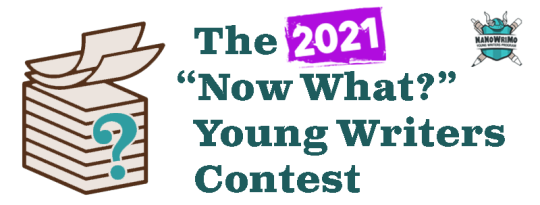
Last month, we challenged our Young Writers to submit a 400 word excerpt from their NaNoWriMo novels. From over 500 fabulous entries, we chose two Grand Prize Winners and four Runners-Up. We hope you enjoy reading them as much as we did!
Many people mistakenly believe that the record for the 50-meter dash was set by Irina Privalova in 1995, however the real time was set by Eleanor Franks as she slid down the hallway and into the principal’s office.
Ellie had never been to the principal’s office. It wasn’t like she got into trouble (not that she had time for trouble), and she wasn’t one of the girl-scout types who carried a clipboard wherever they went and guilt-tripped your mom into buying cookie dough she didn’t need, but didn’t not need. She knew plenty of those. She used to be one of those.
She spun around the doorway. The PA system had said, in the grainiest voice possible, that her mother was here, and that could only mean one thing: Grandpa.
“What happened?” she demanded. Grandpa was something special, an inhabitant of a different world that was somehow lonely and bursting with people and places and things and ideas that you could coax out of him with a beer and basketball on the couch.
Ellie wouldn’t let anything happen to Grandpa.
“Miss Franks, please refrain from running in the halls.” The principal, Mr. Travis, was intimidating, but he was so tiny that Ellie at her relatively short five foot four could tower over him.
“Yes, sir,” she said.
“Mrs. Franks, we have her excusal slip right here. Give me a moment…” He wandered off in search of her pink slip.
“Ellie, it’s Grandpa. He’s in the hospital. The rest of us are over there right now.”
“Well—well, is he going to be okay?” She couldn’t stand this limbo. Grandpa was alive, Grandpa was dead. She had no intention to let her precious Grandpa become fate’s Schrödinger’s cat.
“It seems like it.” Ellie’s sigh of relief was enough to wake up Mrs. Tafferty, their sickly sweet school nurse, who was napping in her chair like usual, and that was a feat she could put on her resumé.
Mr Travis returned, holding the elusive excusal slip. Ellie’s mother placed a hand on her shoulder and looked at her like, “Quit bouncing your leg like a crazy person,” so she did.
“Take a few deep breaths while you’re at it,” her eyes added. The eyes were usually correct, so she followed those instructions as well.
The only time Ellie hadn’t listened to those eyes, her little brother Cody lost a lot of blood.
Special guest judge Christina Li had this to say about “A Well-Worn Window Seat”: “It had an incredible first line and set up the story really well! Definitely one of the most memorable story beginnings I’ve read.”

Julia (aka Josie) B. is a voracious reader who likes to draw comics, play the drums, shoot hoops, and spam famous poems in chats to her friends when she’s not at school. Her favourite genres are romance and action, which is unfortunate, as she actively roots for the love interests to fight to the death for the affections of the main character. She plans to spend the summer finishing and editing her novel.
April 15, 2021
Read the YWP Novel Excerpt Contest Grand Prize Winner (14-18 Age Group)!

Last month, we challenged our Young Writers to submit a 400 word excerpt from their NaNoWriMo novels. From over 500 fabulous entries, we chose two Grand Prize Winners and four Runners-Up. We hope you enjoy reading them as much as we did!
Nikolai was living on borrowed time.
He’d known it for years, and he felt it now more than ever in the stiffness of his legs and the ice in his fingers. He stretched his hands in front of him (cuffed and shackled, of course, cold metal decorated by carved sigils meant to hold him powerless—some he recognized, some he didn’t) and his shoulder popped loudly. To his right, his lawyer shifted at the noise, but didn’t deign to comment.
The courtroom had taken a recess and left him in chains, a guard stationed at each exit, and another staring him down from behind the judge’s bench. His lawyer returned early, a frustrated furrow in her brow and no further explanation. Now, he craned his neck to peer around her, and watched as the jury and the audience arrived through the double doors.
Borrowed time, he repeated to himself, as the members of the jury refused to make eye contact with him. Out of guilt or out of fear, he couldn’t be sure, but he suspected the latter. He turned to the people behind him, and he didn’t recognize a single face in the scant crowd staring back at him, each expression carefully blank. Save for one man dressed in a deep red suit, who hadn’t been there earlier, and when Nikolai saw him, his throat went dry.
Fate put a quiet finger to his mouth and gave Nikolai a slight smile. The message was clear.
His work wasn’t finished.
The room fell silent, the judge made her way to her desk, and as the final member of the audience took a seat, the doors swung closed.
“Please approach the podium, Mr. Esterren.”
Nikolai did as he was told. He alone could see Fate, he realized—he was the only one who knew Fate didn’t belong, and surely the only one who noticed the long cracks appearing in the smooth walls and the white columns above the judge, invisible dust settling atop her carefully organized desk as she droned on.
He couldn’t hear the formalities, couldn’t sense a thing over the rushing in his ears and the lines in the walls, until everything seemed to freeze and the voices around him came back into focus.
“We the jury find the defendant, Nikolai Esterren, to be guilty of the listed crimes and as such, sentenced to—"
The walls caved in.
Special guest judge Christina Li had this to say about “Ashes to Ashes”: “I absolutely loved how it had an excellent sense of pacing and suspense! I was intrigued from the first line and it ended at just the perfect moment — I wanted to know more!”

Sophie C. is an aspiring author who enjoys writing, running, and baking more desserts than her family can eat. She’s currently a high school junior and intends to study computer science once she graduates, though she doesn’t plan on giving up writing anytime soon. She spends more time thinking about her novels than writing them, but she hopes to publish at least one of them sometime in the future.
April 14, 2021
8 Mistakes to Avoid While Writing the Perfect Ending to Your Novel

Every year, we’re lucky to have great sponsors for our nonprofit events. Novlr, a 2021 NaNoWriMo sponsor, is the smart writers’ choice for novel writing software. Today, Novlr is here to share some tips on writing the perfect ending to your novel. Don’t forget to check out their offer to NaNoWriMo writers for 40% off their software!
Is the ending of your novel the most excruciatingly difficult part of the writing process? Is it the most hair-pulling, mind-racking, maddening last step that almost puts paid to the idea of finishing the thing at all? Maybe.
It’s difficult. The ending is so important. It’s your reader’s last impression of the book and it will do exactly that—last.
Just like with the opening to your novel, there is no single formula to follow that works across all genres, but there are some common mistakes you can avoid to make sure your ending is as satisfying and memorable as possible.
What’s the aim of your ending?Simple:
To last in your reader’s mind, and For the story to feel complete.You want your reader chewing over the ending long after they’ve put your book down. Whether it’s a happy ending they are pleased about, a moral learning that sticks in their brain, or an ambiguity that lingers as they consider what will come next. Whichever of these common ending tropes you use, you want your story to feel ‘complete’. To achieve this, there are some things you really shouldn’t be doing:
1. Don’t close with your first idea.Don’t finish your novel with the first idea you have to end it. Your first idea is probably also your reader’s first idea. Dig deep and consider ways to end your novel that are a little more unexpected. You know your characters and their backstory, think about ways to resolve the conflict of the novel in a way that feels a little fresh. The best way to do this is ditch your first idea. And maybe your second too.
2. Don’t end with a cliffhanger.Don’t get me wrong, I understand that ending on a cliff-hanger is a valid way to end a novel. However, do not do this with all plot and sub-plot points. And do it with caution.
Your reader needs to feel satisfied, so leaving one of the plot points on a cliff-hanger, even when done well, may not be appreciated. However, it does have the potential to be the perfect bait to lure readers for the next in the series. To 'do this well’ you have to be very intentional. You need to leave them wanting more but with enough resolution around the rest of the story that they find it exciting rather than frustrating. It’s tricky, but possible if you decide this is the absolute best way to end.
3. Don’t resolve everything in the last three pages.Whilst some resolution may be best kept right up until the last couple of the pages, you do not need to do this for every sub-plot point. Spend the last couple of chapters of your novel resolving some of the smaller plot points and save the most meaningful and full circle stuff until the end. This will make the resolutions for each of those much more satisfying than a lightning-speed ride through all revelations jammed into the last three pages.
4. Don’t spell it out for your audience.Just like in the opening to your novel, you need to give your reader some credit and not labour the points. Be subtle in the conclusions you want them to draw. Show, don’t tell.
5. Don’t make it too improbable.There is nothing more frustrating than investing your time in a novel to find that the ending is at best, improbable, at worst, entirely unbelievable. If you are writing sci-fi you may have a little more leeway here (although I think the advice still holds). There are no hard rules, particularly with more fantastical genres, but the same still applies: the ending should be something perfectly probable in the world you have created.
If your superhero mysteriously develops a new skill ten pages before the end that resolves all plot points…that’s annoying. If your MC has a habit of sabotaging all personal relationships with the same behaviors, that then happen to disappear just in time for the end…eugh. If someone or something is struck by lightning!? No.
Things that are just a little too lucky are pretty irritating to a reader. Within whatever rules exist for the world of your novel, the perfect resolution should become obvious in hindsight. Your reader should be able to look back and say, yeah, that makes sense, even if they couldn’t have predicted it themselves. Even if your ending is supremely fantastical, it has to be foreshadowed, you have to lay the groundwork for that to make sense.
6. Don’t let your story fizzle out.Don’t put in a novel’s worth of foreshadowing only to decide not to have any of the plot points come to fruition. If it seems like your MC is going to have to face their biggest fear and then in the end they actually just move to another country instead, that isn’t going to be very satisfying.
7. Don’t think about the end only at the end.Always have the end in sight—lay the foundation. If you are going to pull the rug from under your reader with a twist, be subtle but do leave the markers in the text for them to see in hindsight. If you are going to come full circle back to the opening, guide them back round to that denouement. If you are going for happily ever after, make sure you foreshadow the hope you want you readers to have for that resolution. Most of the work for the novel ending is in the marathon middle.
8. Don’t neglect the beginning.All novels are going to have a central conflict introduced in the beginning. This is the driving force for the whole book and it absolutely cannot be neglected. Make sure you consider very carefully whether the question or conflict you have posed to your reader in the beginning has been satisfactorily resolved.
Avoid these mistakes and you’ll be well on your way to a great story. Take a look at your favorite books. Which do you remember most and how did they end? What happened in the last chapter/last few pages/last few lines?
Novlr is the smart writers’ choice for novel writing software. Novlr works online and offline, on desktop and mobile. A beautiful writing interface focuses the mind, and hides an array of options to set goals, track your progress, earn writing streaks and see your writing stats. Whatever your story, there is no better place to form your perfect ending than in Novlr.
Top photo by Emma Matthews Digital Content Production on Unsplash
April 13, 2021
"The first draft is the writing, right? The imaginative, wild, fun part? And revision is the work of..."
-

Born and raised in rural Australia, Jen Breach lives and writes in Philadelphia. They are the author of female-led adventure middle-grade graphic novel CLEM HETHERINGTON AND THE IRONWOOD RACE and funny-punny picture book SOMETHING’S AMISS AT THE ZOO. Own voices chapter book series RILEY REYNOLDS is forthcoming from Capstone in 2022, and nonfiction picture book SOLSTICE from What on Earth Books in 2023. Jen is queer and nonbinary and believes that truth telling is the least child readers deserve. Along with a dash of mischief.
Your Camp Care Package is brought to you by Camp NaNoWriMo. Sign up to receive more Camp Care Packages at nanowrimo.org!
April 12, 2021
Taming the Writing Process One Good Habit at a Time

How has participating in NaNoWriMo impacted you? Long-time Wrimo Elizabeth Braughler describes her success at NaNoWriMo as “life-changing” and seeks to share that transformative experience with others:
“Our library hosts what?”
I stared at the message I’d received in reply to my inquiry on local writing groups. It had taken everything in me to hit send, to admit to someone other than my family that I was actively writing. Attempting a full fledged novel, no less.
I knew it wasn’t going well. I’d been at the same story for well over a year, with only a few chapters and a million (or so it felt) rewrites. I couldn’t push through and my motivation was lagging. I was only writing when I felt inspired, which meant I wasn’t writing.
Enter NaNoWriMo, and — at the risk of giving away my happy ending — I won my first ever NaNo.
Most of you probably already know why I had that success, because you’ve experienced it firsthand. NaNoWriMo means a lot of things to a lot of different people and, for me, it was the stepping-stone that would formulate my writing process.
I jumped on the NaNoWriMo site a month out from its start and signed up. I was utterly clueless as to what I was getting myself into. I didn’t even get what word sprints meant prior to my journey with NaNo. I was the newest of newbies. I prepped very little, being the pantser I claimed to be, and ditched my old novel to start fresh with a new idea.
I think it may have something to do with my competitive nature, but I thrived. The idea of crushing word counts each day drove me, and you better believe I worked hard to win some of those word sprints, once I actually got what they were.
I had finally found a process that worked for me: sitting down every day and writing. It didn’t have to be perfect or even great; it was a first draft, which I learned could suck. I was taking the time to form a new habit — a good one — that made me go from piddling around on my keyboard to actually producing a full story. It didn’t matter if what I wrote was inspired or just helped me get from point a to point b. Writing daily worked my creative muscles.
Even when November came and went, I kept going. I had more story to tell and I now knew if I could write 50,000 words in a month, then I could certainly reach 100,000 in the span of two. I pushed through those next thirty-one days and finished a complete first draft. I got to the very end of my story. It was rough and messy, but I had done it.
The funny thing was, I’d expected to feel sated when I wrote that last sentence. Instead, I felt like I’d just begun. As if I’d unlocked a new facet of myself that was ready to be put to work. I wanted to keep writing.
Even just a few months after NaNo, things already look a bit different for me. My pantsing-loving self has taken to at least prepping basic outlines and I’ve gotten connected to a writing group that inspires me and keeps me motivated.
The one thing that hasn’t changed for this novice writer, however, is the practice of working on a project daily. Whatever the time frame I’ve blocked out — a month, two months — I commit to working on the manuscript every day. It’s a really small step in a much larger scheme of the mysterious writer process, but it’s one that’s working well for this writer and I’m sticking to it.

Elizabeth is new to the world of writing, having joined NaNoWriMo in 2020 which led to participation with the online community of Pennwriters. When she’s not working on a manuscript, you’ll most likely find her with a fantasy novel and good cup of coffee. Though she’s had varying vocations from barista to birth doula, she finds her role as a full-time homeschool parent to be the most rewarding. Elizabeth lives in northwestern Pennsylvania with her husband, two daughters and bernedoodle.
Photo by Markus Winkler on Unsplash.
April 9, 2021
“Never forget you are in control of your story. You choose...
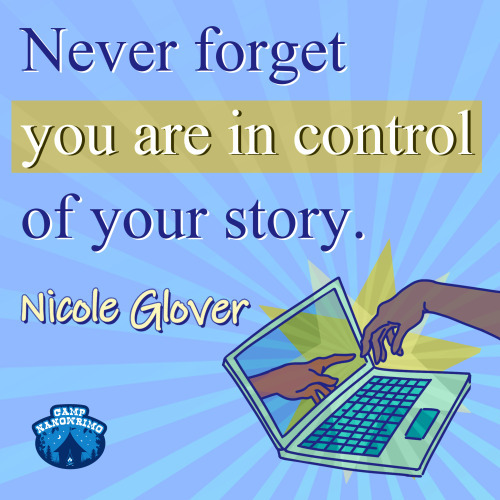
“Never forget you are in control of your story. You choose what happens. If you don’t like a certain scene, character, or dialogue, cut it from the story. It’s your story you can do whatever you want with it. No writing is set in stone, you can always change what you written later.”
Nicole Glover works as a UX researcher in Virginia. She believes libraries are magical places and problems seem smaller with a cup of tea in hand. Her life outside of books include bicycles, video games, and baking the perfect banana bread.
The Conductors
is her debut novel.
Thank Nicole for her Camp Care Package!
Your Camp Care Package is brought to you by Camp NaNoWriMo. Sign up to receive more Camp Care Packages at nanowrimo.org!
Image description: An illustrated graphic on a blue background with the blue and white “Camp NaNoWriMo” logo in the bottom left-hand corner. The graphic shows a laptop computer with a brown hand on the screen and another brown hand hovering over the keyboard. There is a yellow star in the background where the two hands almost touch. Above the illustration, blue and white text with yellow highlighting says: “Never forget you are in control of your story.” The quote attribution text is “Nicole Glover”.
Chris Baty's Blog
- Chris Baty's profile
- 63 followers



